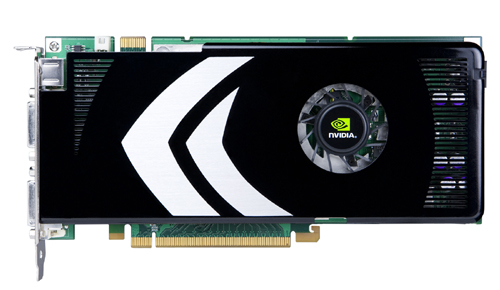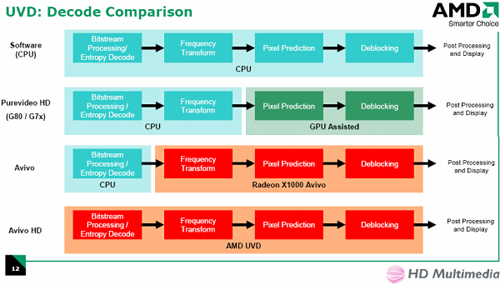NVIDIA GeForce 8800 GT: The Only Card That Matters
by Derek Wilson on October 29, 2007 9:00 AM EST- Posted in
- GPUs
The Card
The GeForce 8800 GT, whose heart is a G92 GPU, is quite a sleek card. The heatsink shroud covers the entire length of the card so that no capacitors are exposed. The card's thermal envelop is low enough, thanks to the 65nm G92, to require only a single slot cooling solution. Here's a look at the card itself:

The card makes use of two dual-link DVI outputs and a third output for analog HD and other applications. We see a single SLI connector on top of the card, and a single 6-pin PCIe power connector on the back of the card. NVIDIA reports the maximum dissipated power as 105W, which falls within the 150W power envelope provided by the combination of one PCIe power connector and the PCIe x16 slot itself.
The fact that this thing is 65nm has given rise to at least one vendor attempting to build an 8800 GT with a passive cooler. While the 8800 GT does use less power than other cards in its class, we will have to wait and see if passive cooling will remain stable even through the most rigorous tests we can put it through.
Earlier this summer we reviewed NVIDIA's VP2 hardware in the form of the 8600 GTS. The 8800 GTX and GTS both lacked the faster video decode hardware of the lower end 8 Series hardware, but the 8800 GT changes all that. We now have a very fast GPU that includes full H.246 offload capability. Most of the VC-1 pipeline is also offloaded by the GPU, but the entropy encoding used in VC-1 is not hardware accelerated by NVIDIA hardware. This is less important in VC-1, as the decode process is much less strenuous. To recap the pipeline, here is a comparison of different video decode hardware:

NVIDIA's VP2 hardware matches the bottom line for H.264, and the line above for VC-1 and MPEG-2. This includes the 8800 GT.
We aren't including any new tests here, as we can expect performance on the same level as the 8600 GTS. This means a score of 100 under HD HQV, and very low CPU utilization even on lower end dual core processors.
Let's take a look at how this card stacks up against the rest of the lineup:
On paper, the 8800 GT completely gets rid of the point of the 8800 GTS. The 8800 GT has more shader processing power, can address and filter more textures per clock, and only falls short in the number of pixels it can write out to memory per clock and overall memory bandwidth. Even then, the memory bandwidth advantage of the 8800 GTS isn't that great (64GB/s vs. 57.6GB/s), amounting to only 11% thanks to the 8800 GT's slightly higher memory clock. If the 8800 GT does end up performing the same, if not better, than the 8800 GTS then NVIDIA will have truly thrown down an amazing hand.
You see, the GeForce 8800 GTS 640MB was an incredible performer upon its release, but it was still priced too high for the mainstream. NVIDIA turned up the heat with a 320MB version, which you'll remember performed virtually identically to the 640MB while bringing the price down to $300. With the 320MB GTS, NVIDIA gave us the performance of its $400 card for $300, and now with the 8800 GT, NVIDIA looks like it's going to give us that same performance for $200. And all this without a significant threat from AMD.
Before we get too far ahead of ourselves, we'll need to see how the 8800 GT and 8800 GTS 320MB really do stack up. On paper the decision is clear, but we need some numbers to be sure. And we can't get to the numbers until we cover a couple more bases The only other physical point of interest about the 8800 GT is the fact that it takes advantage of the PCIe 2.0 specification. Let's take a look at what that really means right now.
The GeForce 8800 GT, whose heart is a G92 GPU, is quite a sleek card. The heatsink shroud covers the entire length of the card so that no capacitors are exposed. The card's thermal envelop is low enough, thanks to the 65nm G92, to require only a single slot cooling solution. Here's a look at the card itself:

The card makes use of two dual-link DVI outputs and a third output for analog HD and other applications. We see a single SLI connector on top of the card, and a single 6-pin PCIe power connector on the back of the card. NVIDIA reports the maximum dissipated power as 105W, which falls within the 150W power envelope provided by the combination of one PCIe power connector and the PCIe x16 slot itself.
The fact that this thing is 65nm has given rise to at least one vendor attempting to build an 8800 GT with a passive cooler. While the 8800 GT does use less power than other cards in its class, we will have to wait and see if passive cooling will remain stable even through the most rigorous tests we can put it through.
Earlier this summer we reviewed NVIDIA's VP2 hardware in the form of the 8600 GTS. The 8800 GTX and GTS both lacked the faster video decode hardware of the lower end 8 Series hardware, but the 8800 GT changes all that. We now have a very fast GPU that includes full H.246 offload capability. Most of the VC-1 pipeline is also offloaded by the GPU, but the entropy encoding used in VC-1 is not hardware accelerated by NVIDIA hardware. This is less important in VC-1, as the decode process is much less strenuous. To recap the pipeline, here is a comparison of different video decode hardware:

NVIDIA's VP2 hardware matches the bottom line for H.264, and the line above for VC-1 and MPEG-2. This includes the 8800 GT.
We aren't including any new tests here, as we can expect performance on the same level as the 8600 GTS. This means a score of 100 under HD HQV, and very low CPU utilization even on lower end dual core processors.
Let's take a look at how this card stacks up against the rest of the lineup:
| Form Factor | 8800 GTX | 8800 GTS | 8800 GT | 8600 GTS |
| Stream Processors | 128 | 96 | 112 | 32 |
| Texture Address / Filtering | 32 / 64 | 24 / 48 | 56 / 56 | 16 / 16 |
| ROPs | 24 | 20 | 16 | 8 |
| Core Clock | 575MHz | 500MHz | 600MHz | 675MHz |
| Shader Clock | 1.35GHz | 1.2GHz | 1.5GHz | 1.45GHz |
| Memory Clock | 1.8GHz | 1.6GHz | 1.8GHz | 2.0GHz |
| Memory Bus Width | 384-bit | 320-bit | 256-bit | 128-bit |
| Frame Buffer | 768MB | 640MB / 320MB | 512MB / 256MB | 256MB |
| Transistor Count | 681M | 681M | 754M | 289M |
| Manufacturing Process | TSMC 90nm | TSMC 90nm | TSMC 65nm | TSMC 80nm |
| Price Point | $500 - $600 | $270 - $450 | $199 - $249 | $140 - $199 |
On paper, the 8800 GT completely gets rid of the point of the 8800 GTS. The 8800 GT has more shader processing power, can address and filter more textures per clock, and only falls short in the number of pixels it can write out to memory per clock and overall memory bandwidth. Even then, the memory bandwidth advantage of the 8800 GTS isn't that great (64GB/s vs. 57.6GB/s), amounting to only 11% thanks to the 8800 GT's slightly higher memory clock. If the 8800 GT does end up performing the same, if not better, than the 8800 GTS then NVIDIA will have truly thrown down an amazing hand.
You see, the GeForce 8800 GTS 640MB was an incredible performer upon its release, but it was still priced too high for the mainstream. NVIDIA turned up the heat with a 320MB version, which you'll remember performed virtually identically to the 640MB while bringing the price down to $300. With the 320MB GTS, NVIDIA gave us the performance of its $400 card for $300, and now with the 8800 GT, NVIDIA looks like it's going to give us that same performance for $200. And all this without a significant threat from AMD.
Before we get too far ahead of ourselves, we'll need to see how the 8800 GT and 8800 GTS 320MB really do stack up. On paper the decision is clear, but we need some numbers to be sure. And we can't get to the numbers until we cover a couple more bases The only other physical point of interest about the 8800 GT is the fact that it takes advantage of the PCIe 2.0 specification. Let's take a look at what that really means right now.










90 Comments
View All Comments
gamephile - Monday, October 29, 2007 - link
Based on benchmarks and price this card is finally in the sweet spot for me which means I can finally ditch my ATI X300! I only have one question remaining and that concerns the noise level. How does it compare to the 8800GTS? Why was this omitted from your review?Vidmar - Monday, October 29, 2007 - link
Ditto! Noise please!!!DerekWilson - Monday, October 29, 2007 - link
we didn't measure noise, as it's a reference board which doesn't necessarily reflect final boards available from OEMs.of course, since you guys want this, we'll try to add it to future GPU launch articles.
For now, it'll have to suffice to say that it isn't a loud card, and it doesn't seem any louder than the 8800 GTS.
Missing Ghost - Tuesday, October 30, 2007 - link
Theses times most retail cards are pretty much the same as the reference cards...michal1980 - Monday, October 29, 2007 - link
I want to know too. If its bettern then my 8800gts 640. I'll ebay that card now for the 8800. esspically with the smaller cooler and quiter.Dantzig - Monday, October 29, 2007 - link
Tom's Hardware did a noise comparison and found that the 8800GT was as quiet or quieter than any of the other 8800 series cards, the 8600 series, and the 2900XT.gamephile - Monday, October 29, 2007 - link
Yeah I saw that, I would just like confirmation from a source I trust.mpc7488 - Monday, October 29, 2007 - link
Lol - nice.The Tech Report did a good review, they have noise figures on page 7. http://techreport.com/articles.x/13479/7">Tech Report 8800GT Noise Levels
gamephile - Monday, October 29, 2007 - link
Also the power consumption image doesn't load for me either. I'm not behind any firewall or proxy.DerekWilson - Monday, October 29, 2007 - link
i'll look into the power graph thing